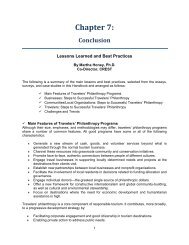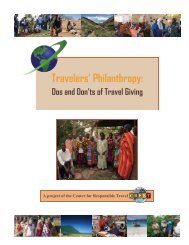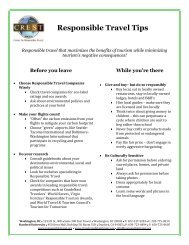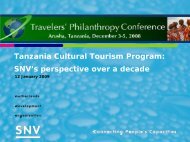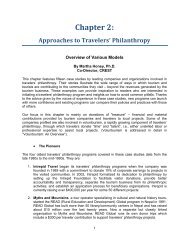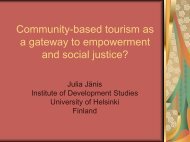Travelers' Philanthropy Handbook - Center for Responsible Travel
Travelers' Philanthropy Handbook - Center for Responsible Travel
Travelers' Philanthropy Handbook - Center for Responsible Travel
Create successful ePaper yourself
Turn your PDF publications into a flip-book with our unique Google optimized e-Paper software.
5When visitors suggest:“Let’s send used clothing.”Youth with donatedclothing, BasecampExplorer, KenyaExperts respond:“Such ef<strong>for</strong>ts are very thoughtful and generous,but they often are counterproductive when youconsider logistical concerns such as shipping,customs duties, pilferage and delivery of theclothes. It is frequently better to buy and donateinexpensive clothing at the destination.”“Clothing should only be sent if requested andtruly needed. Please check with a suitableorganization working in the destination community, as to the specifics ofwhat they require. Your tour operator may be able to suggestappropriate organizations. If you are able to hand carry in appropriateclothing, this can be helpful.”“Find out specifically what type of clothing, gender, sizes and ages aremost needed. Be aware of what is culturally acceptable and suitabledress — i.e., you should not send skimpy women's clothing to aconservative country. Never send secondhand underpants <strong>for</strong> bothreasons of hygiene and dignity.”“It sends a subtle message that because a community is materially poor,it is open to receiving second-hand goods. As a principle,second-hand goods are a mechanism <strong>for</strong> removing self-respect anddignity. They are useful only in a context of emergency reliefsituations.”When visitors ask:“Should we bring school supplies to hand out?”Experts respond:“It’s contingent on what kind of structured relationships the tour companyhas with local communities and what community priorities are. What mustbe avoided is ‘donor’ driven support that does not fit community priorities.Gifts such as school supplies, computers, and clothing can be moreharmful than beneficial if not given in the context of a mutually beneficialrelationship.”“Don’t ‘hand out’ anything. That will only encourage a situation where itbecomes more profitable to hang around tourists than go to school orwork. If there is an existing relationship with an organization that hasneeds, buy supplies from the local economy. The only exception to this iscertain items that are unavailable or very expensive to buy locally.”When visitors suggest:“Let’s start a penpalprogram with alocal school.”Experts respond:“They are difficult tomanage very well andhave lots of variables todeal with. Is the ruralfamily even used togetting mail? Do theyhave access to stamps?Does the mail systemwork?”“Is there a teacher who isexcited about it and wantsthis program? Are thechildren already learningEnglish? Is there anexisting relationship witha school? The mostimportant thing toconsider is whethersomeone is ready tomaintain the program onthe other end.”“Better to send to a classso that if one persondoesn’t get a letter theywon’t feel left out.”Nature Kids Foundation,Nature Air, Costa Rica“They should be given to a head teacher or principal who arranges theirdistribution at a suitable time, <strong>for</strong> instance, at the beginning of term or asincentives <strong>for</strong> achievement. They should not be handed by you directly tostudents because this can encourage a perception that '<strong>for</strong>eigners comeand give you stuff' because you are poor. This can accentuate the unequalrelationship between visitors and locals, as well as encourage begging.”




